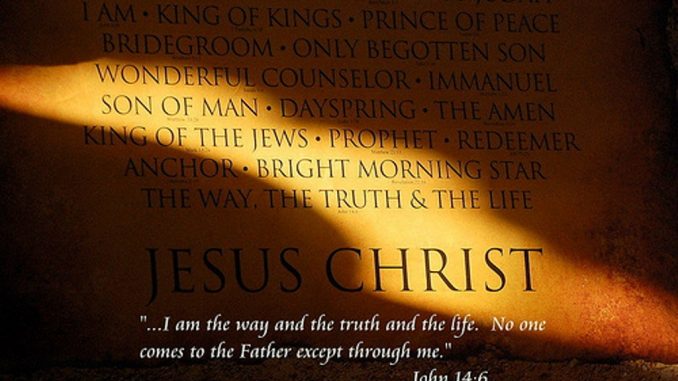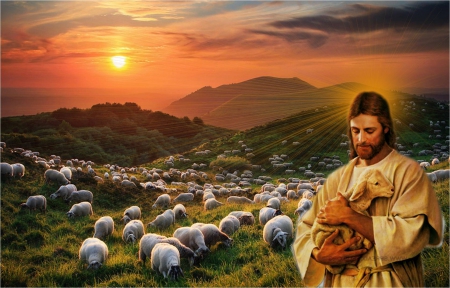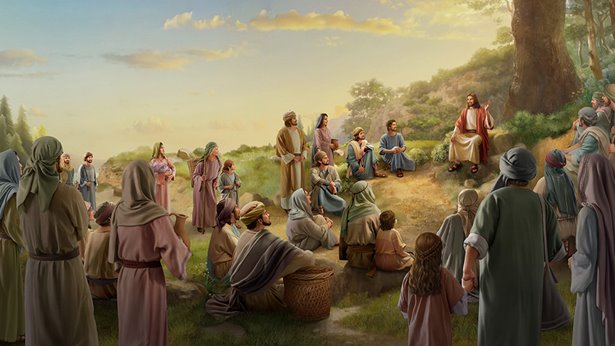
Many of us tend to look at Jesus through a specific lens. This can often colour our approach to Him. Some of us view Jesus as a judge despite Him saying that He did not come to judge the world but to save it (John 12:47). Others view Him as a brotherly figure of peace though He also said in Luke 12:49-56 and Matthew 10:34-39 that He did not come to bring peace on Earth and in fact, He has come to divide people against each other.
Far from being a one-dimensional figure, He was probably the most complex person who has ever walked on Earth. In addition to that, He was the only person who was ever both fully human and fully divine. This complexity has led the well-known Christian author, Philip Yancey, to write his book ‘The Jesus I Never Knew‘ (incidentally the book is highly recommended), and there is an extensive field of study known as Christology ie. the study of who Jesus was and is.

And yet, because Jesus Christ is so important to each one of us, it is of immense value that we get to know Him personally, at least to an extent. He is not just someone who came more than 2000 years for a one-time mission, He is still with us and He is close to us every day.
In the Gospel of John, there are 7 “I Am“s by Christ Jesus. These 7 “I AM“s provide a composite picture of Christ in His own words and they encapsulate some of the most important facets of Jesus’s position and role in the Christian’s life. Furthermore, they are all found within the Gospel by the apostle that is known as the “disciple whom Jesus loved“, a signifier of the close intimacy in the relationship between Jesus and John.
Much like when God answered Moses by replying that He is “I am who I am,” there is power in these statements. There is no falsehood or ambiguity in them, there is only truth. Below is a just a simple outline and commentary of these seven statements of identity by Christ:
1. “I am the bread of life.” (John 6:35, 41, 48, 51) As bread sustains physical life, so Christ offers and sustains spiritual life.

Bread has always been a symbol of sustenance and satisfaction, and they are a staple food in many communities throughout the world. In the Israelites’ history, it was manna (bread from heaven) that sustained the Israelites after their exodus from Egypt. Bread is an important element in the Israelites’ life, marking the commemoration of their freedom from slavery in the Passover feast. The first temptation the devil threw at Christ in the wilderness was to turn stone into bread ie. food so that He would not go hungry. Bread is synonymous with livelihood in such idioms as “to earn his bread and butter” and “bread is the staff of life” and also of fellowship as in “to break bread” with someone.
Jesus is our bread of life. This life that He gives is not just mere sustenance. It goes deep into the spirit and leads to the true, enduring, and fulfilling life that the Messiah gives. It meets more than our physical needs, it goes into our hearts and soul. The Bible recognises our physical needs (the prayer for our daily bread) but more than the simple nutrition of wheat and barley, to partake of the bread of life is to fellowship with God. Through Jesus’s Last Supper where He broke bread with the disciples, it becomes a reminder of our intimacy of union with Christ, and the great salvation accomplished on Good Friday and Easter.
2. “I am the light of the world.” (John 8:12) To a world lost in darkness, Christ offers Himself as a guide.

We currently live in a world that is broken with sin and suffering. And though many may not realise it, it is vital that we reconcile with our Creator. He longs to have a relationship with us, close enough that we are as His children to Him. In a world that is lost in darkness and emptiness and where many are in pursuit of non-lasting things (as the author of Ecclesiastes says, everything is vanity in the grand scheme of things), Christ provides guidance.
What does the light do? It lights up the darkness. It reveals to us who we are and who we were created to be. More than that, the light reveals who God is and His character, and His divine power and majesty. Christ’s gospel and the Bible lights up and tells us everything we need to know for faith and life in this world and the next (2 Timothy 3:16-17). It gives us a beacon of hope.
3.“I am the door of the sheep.” (John 10:7,9) Jesus protects His followers as shepherds protect their flocks from predators.

Much as the gate protects the sheep in the pasture from predators, Christ protects His followers from our enemies. More than that, Christ is the door to eternal life. He is our Saviour, Protector, and Provider. He provides the door into the narrow path that leads to the sanctuary of God.
4.“I am the resurrection and the life.” (John 11:25) Death is not the final word for those in Christ.

Only God is immortal. Ever since sin spoiled creation, all other living things die. On the cross, the immense sacrifice by Christ paid the ransom for sin and broke the curse of death. Now, for whoever believes in Him, there is no longer fear of death.
The Bible speaks of life as something enduring. And more than just a function, the kind of life Christ brings also leads us to know the one true God. The way to know God is to align with Christ and to walk with Him as both our Lord and Saviour in obedience. Jesus is the sent One whose obedience wins eternal life and restores God’s original plan.
Eternal life is not just something we get when we go to Heaven. It begins when we have a relationship with Christ. It leads us to light, freedom, and love. It is abundant (John 10:10), helps us to overcome our present troubles (John 14:1), and anticipate a future of joy and peace.
5. “I am the good shepherd.” (John 10:11, 14) Jesus is committed to caring and watching over those who are His.

Jesus is our Good Shepherd. This is closely related to an identity of God, Jehovah Raah, which means ‘The Lord is my Shepherd‘. A shepherd guides sheep to pasture, protects them, and feeds them. The sheep is wholly dependent on the shepherd, and the relationship between a shepherd and his sheep is often deeper than his relationship with his family or friends. Christ has already given His life for us once, we can trust His commitment to care and watch over those who are His.
6.“I am the way, the truth, and the life.” (John 14:6) Jesus is the source of all truth and knowledge about God.

Contained in this one statement are three key attributes of Christ; way, truth, and life. When Christ paid the ransom for our sins, He established a new covenant and opened the way for a direct relationship with God.
The people around Christ did not understand Him. They had expected a powerful political figure. Instead, He came as a suffering servant. Rather than liberation from Rome, His message was of the coming of the kingdom of God, the victory of God over evil, and the love of God for all people. Christ showed us a way to truth and knowledge about God and this was the gospel message; that God so loved the world. It was such a paradigm shift that the people couldn’t accept it. This paradigm shift still divides Christians from many in the world who do not understand until today.
The right response to the gospel is faith. We cannot achieve eternal life through our own efforts and work but Christ has provided the way. The gospel is the gift of eternal life, the penalty of sin paid in full by Christ. In response, we receive it by faith as we surrender our lives and futures to God.
7.“I am the true vine.” (John 15:1, 5) By attaching ourselves to Christ, we enable His life to flow in and through us. Then we cannot help but bear fruit that will honor the Father.

Christ is the bread of life; the light in a dark world; the door to the narrow path; the resurrection and the life; the good shepherd; and the way, truth, and life. How could we do without Him? And best of all, by attaching ourselves to Him, by cultivating intimacy with Him, His life flows in and through us. And at the end of it, we bear fruits that will honor the Father.
This article is guided throughout by pointers from Thomas Nelson Bibles and the book Big Ideas of the Bible from Barbour Publishing.
|Share The Good News|




Leave a Reply